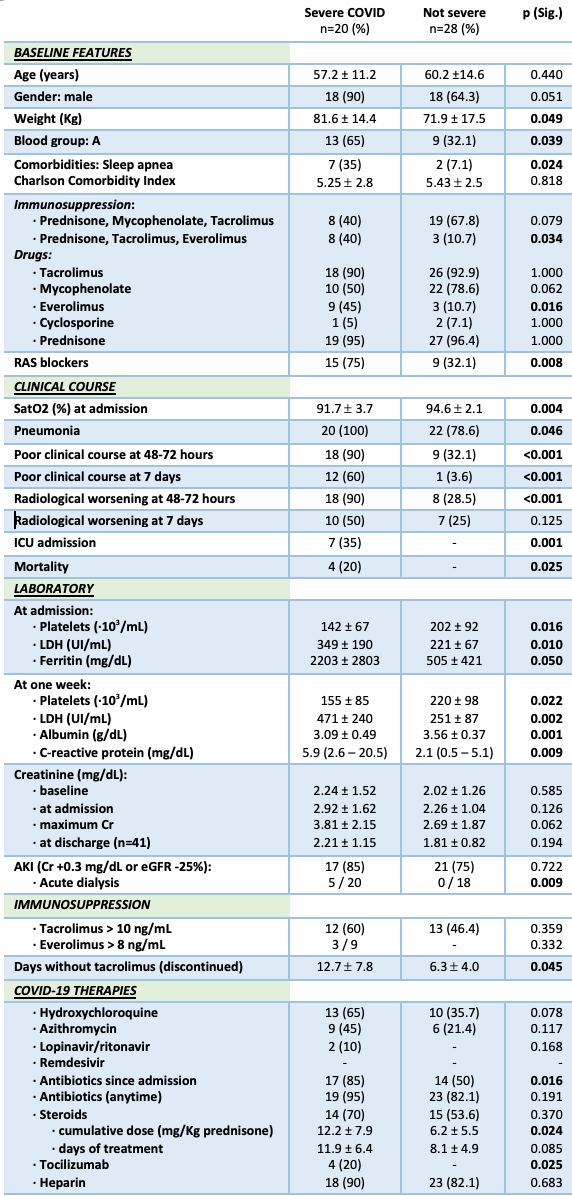COVID-19 in Hospitalized Kidney Transplant Recipients: Clinical Course, Prognostic Factors and Differences Between First and Second Waves
N. Macías, M. Rodríguez Ferrero, A. Acosta, J. Carbayo, Á. González Rojas, A. Muñoz de Morales, A. García Prieto, M. Goicoechea
Nephrology, Hospital Gregorio Marañón, Madrid, Spain
Meeting: 2021 American Transplant Congress
Abstract number: 748
Keywords: Infection, Kidney transplantation, Pneumonia, Sirolimus (SLR)
Topic: Clinical Science » Infectious Disease » All Infections (Excluding Kidney & Viral Hepatitis)
Session Information
Session Name: All Infections (Excluding Kidney & Viral Hepatitis)
Session Type: Poster Abstract
Session Date & Time: None. Available on demand.
Location: Virtual
*Purpose: The aim was to describe the clinical course and management of SARS-CoV-2 infection in kidney transplant recipients (KTR) hospitalized with COVID-19, identify risk factors for severity, and analyze the differences between first (March-June) and second (Aug-Nov,2020) waves.
*Methods: Retrospective, single-center study in 48 KTR (24 in each wave) admitted with COVID-19. Baseline features, immunosuppression, clinical findings, laboratory and radiological data and therapies were analyzed to identify risk factors for “severe COVID” (requiring oxygen reservoir bag, high-flow nasal cannula and/or invasive mechanical ventilation).
*Results: Age was 58.9 ± 13 years, 75% were male, 60.5 (24 – 143) months after KT. 20.8% were nosocomial and there were 2 “reinfections”. Main symptoms were fever (71%), dyspnea (56%), cough (48%) and diarrhea (40%). 87.5% developed pneumonia, 77% needed supplemental oxygen, 14.6% were admitted to ICU (12.5% for invasive ventilation) and 8.3% died.
Table 1 shows main differences in KTR with severe COVID. In multivariable regression analysis with different models including age, sex, blood group, comorbidity, immunosuppression, RAS blockers and:1) SatO2, platelets and LDH at admission: only everolimus (adjusted OR: 204, p 0.047) as independent predictor for severity.2)clinical course: everolimus (adjusted OR: 61.7, p 0.021) and poor clinical course at one week (adjusted OR: 546, p 0.015) were associated with severe COVID.In the second wave the patients consulted earlier (p 0.029) and SARS-CoV-2 infection was less severe (p 0.001) with less use of reservoir (p 0.008), lower inflammatory markers at admission [CRP (p 0.010), IL-6 (p 0.048) and ferritin (p 0.045)], and more mild cases without oxygen need (p 0.048). There were fewer pneumonia at admission and 48h after, but no differences at one-week, and more patients were treated with steroids (79% vs 42%, p 0.017).
*Conclusions: Everolimus could represent a risk factor for severity in KTR hospitalized with COVID-19. In the second wave there was a wider use of steroids, though SARS-CoV-2 infection was less severe.
To cite this abstract in AMA style:
Macías N, Ferrero MRodríguez, Acosta A, Carbayo J, Rojas ÁGonzález, Morales AMuñozde, Prieto AGarcía, Goicoechea M. COVID-19 in Hospitalized Kidney Transplant Recipients: Clinical Course, Prognostic Factors and Differences Between First and Second Waves [abstract]. Am J Transplant. 2021; 21 (suppl 3). https://atcmeetingabstracts.com/abstract/covid-19-in-hospitalized-kidney-transplant-recipients-clinical-course-prognostic-factors-and-differences-between-first-and-second-waves/. Accessed March 4, 2026.« Back to 2021 American Transplant Congress

